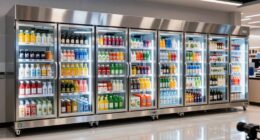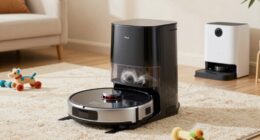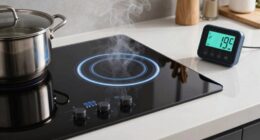Are you a parent or caregiver who seeks to guarantee the highest level of safety for your little ones? Look no further! Childproofing: Essential Appliance Safety Measures is available to assist you in mastering the art of safeguarding your children from potential dangers in your home.
We understand the importance of appliance safety regulations and the need to secure every corner of your house. From the kitchen to the living room, we will guide you through the steps of childproofing your appliances, providing you with peace of mind.
No longer will you have to worry about accidents with stoves, ovens, or even electronics. Join us on this journey to create a safe environment for your precious ones.
Let’s get started!
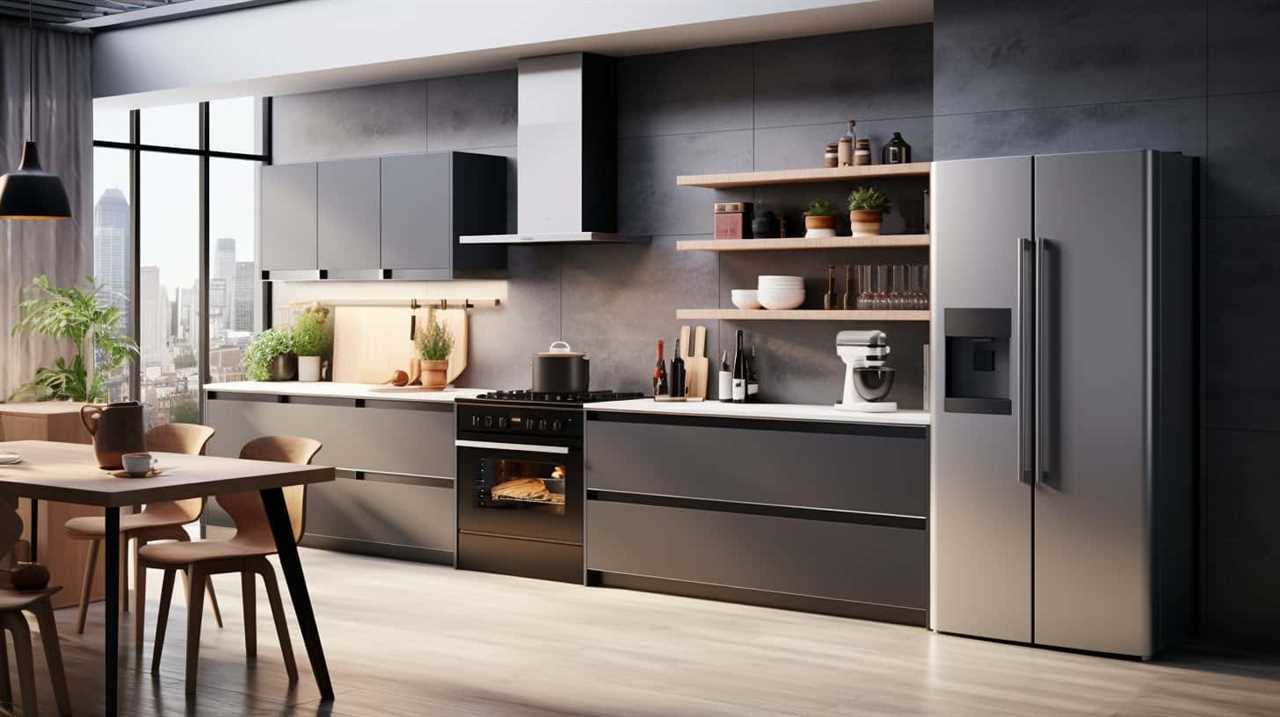
Key Takeaways
- Childproofing appliances is crucial for ensuring the safety of children.
- Understanding appliance safety regulations is important for compliance and protection.
- Hot stove safety and knife storage solutions are essential in the kitchen.
- Properly securing kitchen stoves, ovens, small appliances, and electrical outlets is vital for child safety.
Importance of Childproofing Appliances
One of the most crucial aspects of childproofing our home is ensuring the safety of our appliances. As parents, it’s our responsibility to create a safe environment for our children, and this includes taking necessary measures to prevent accidents involving appliances.
The importance of supervision can’t be stressed enough when it comes to keeping our little ones safe. Appliances such as stoves, ovens, and even washing machines can pose serious risks to curious toddlers and young children. It’s essential to keep a watchful eye on them at all times when they’re in close proximity to these appliances. This means never leaving them unattended in the kitchen or laundry room. Accidents can happen in a split second, and it’s our duty to prevent them.
In addition to constant supervision, there are other steps we can take to childproof our appliances. Installing safety locks on oven doors and refrigerator doors can prevent children from accessing them. Securing cords and plugs to prevent tripping hazards is also important. Furthermore, using outlet covers and stove knob covers can prevent accidental injuries and burns.
Childproofing appliances may require some time and effort, but the peace of mind it brings is priceless. By taking these precautions and ensuring constant supervision, we can create a safe environment for our children and reduce the risk of accidents involving appliances.
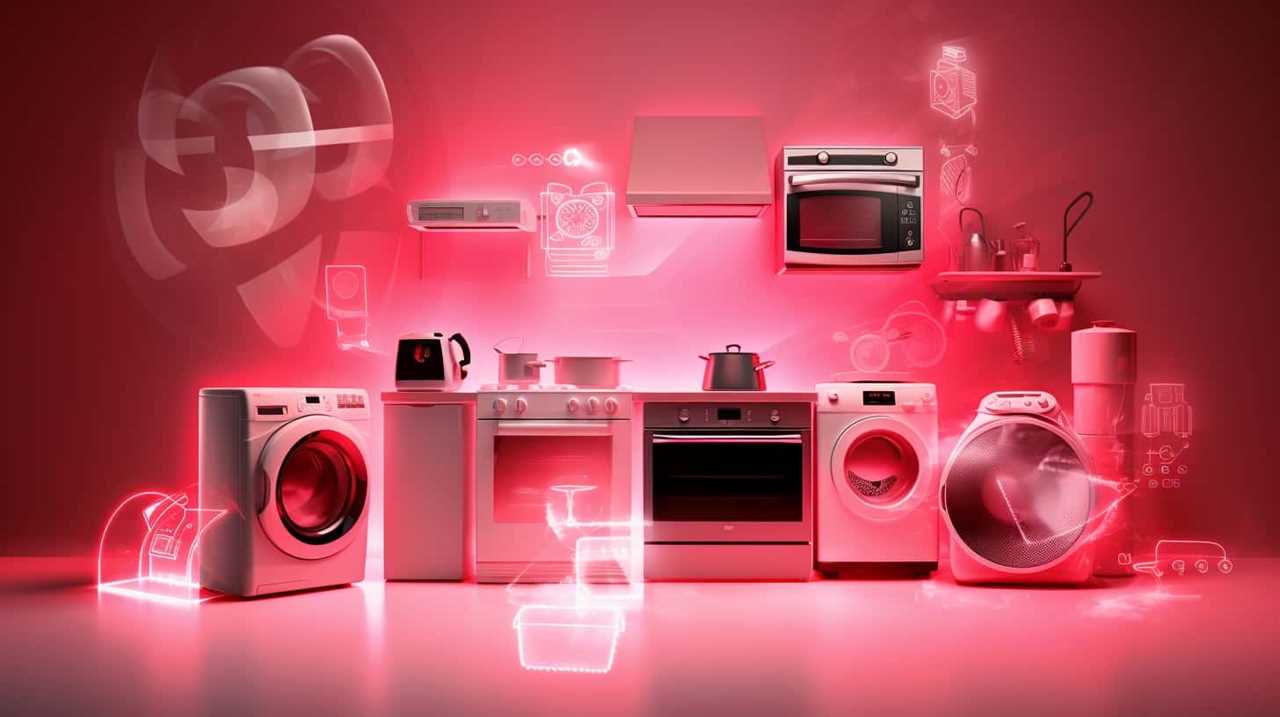
Let’s prioritize their safety and make our homes a haven for our little ones.
Understanding Appliance Safety Regulations
To ensure the safety of our children, it’s important for us to understand and comply with appliance safety regulations. These regulations, also known as appliance safety standards, are put in place to protect children from potential hazards posed by household appliances. By familiarizing ourselves with these standards and implementing childproofing regulations, we can create a safer environment for our little ones.
Appliance safety standards are guidelines that manufacturers must follow when designing and producing household appliances. These standards aim to prevent accidents and injuries caused by appliances, such as burns, shocks, or entrapment. They cover various aspects, including electrical safety, stability, and the use of child-resistant features.
When childproofing our homes, it’s essential to consider these regulations. Start by ensuring that all appliances meet the required safety standards. Check for safety certifications and labels indicating compliance with relevant regulations. It’s also crucial to secure appliances to prevent tipping or falling, especially those that are heavy or have movable parts.

Furthermore, childproofing regulations may include using safety locks or latches on appliances that children can access easily, such as ovens or refrigerators. Keep cords out of reach and cover electrical outlets to minimize the risk of electric shock.
Understanding and adhering to appliance safety regulations is vital for the well-being of our children. By taking appropriate measures, we can create a home environment that promotes their safety and reduces the likelihood of accidents or injuries caused by household appliances.
Common Hazards in the Kitchen
Let’s talk about some common hazards in the kitchen that every parent should be aware of.
First, we need to address the hot stove safety. It’s crucial to teach our children that the stove isn’t a toy and can cause serious burns.

Additionally, we should explore knife storage solutions to prevent accidents and keep sharp objects out of reach.
Hot Stove Safety
When it comes to hot stove safety in the kitchen, our main concern is preventing burns and accidents. Hot stove burners can be a major hazard, especially for curious children. To ensure their safety, it’s important to take certain precautions.
First, always turn the pot handles toward the back of the stove, away from the reach of children. This will prevent them from accidentally pulling down a hot pot and getting burned.
Additionally, installing stove knob safety covers can be extremely beneficial. These covers act as a barrier, preventing children from turning on the stove and potentially causing a fire or burning themselves.
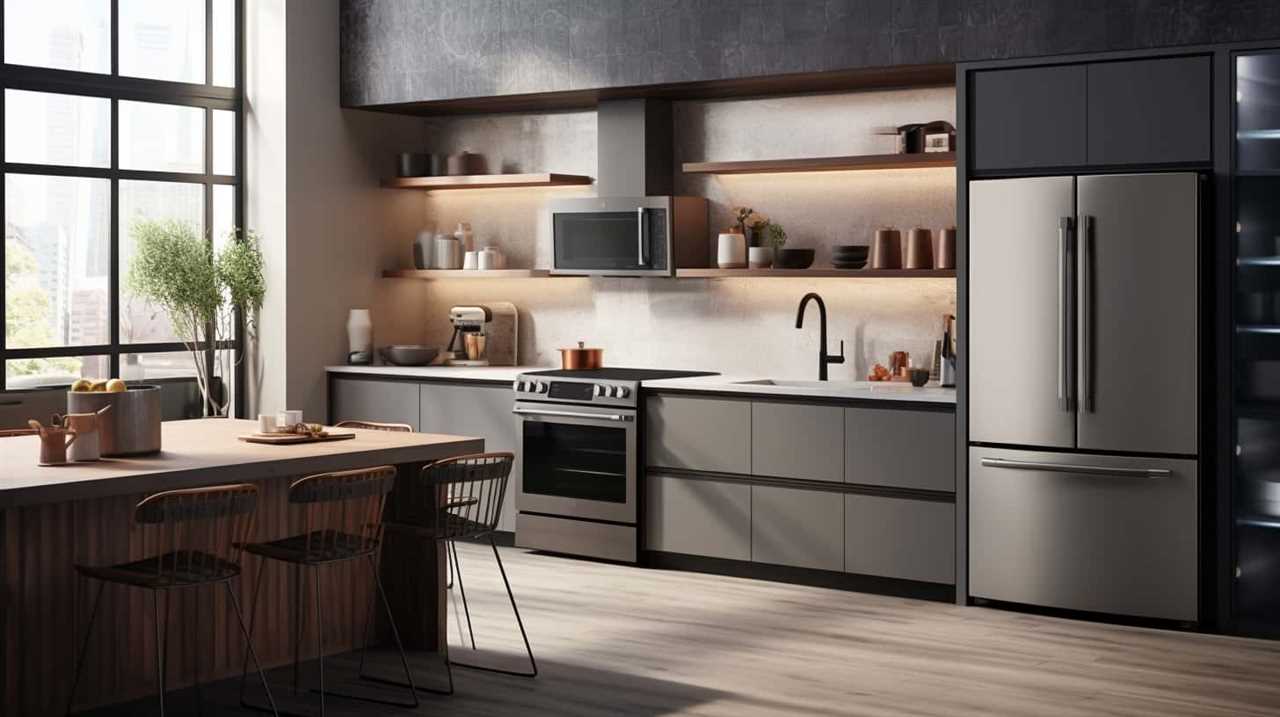
Knife Storage Solutions
We prioritize the safety of our little ones in the kitchen by implementing effective knife storage solutions to prevent common hazards. Ensuring that knives are stored securely and out of reach is crucial in maintaining a childproof kitchen environment. Here are some knife storage options and safety precautions to consider:
- Magnetic knife strips: Mounting a magnetic strip on the wall keeps knives organized and prevents them from being accidentally knocked off the counter.
- Knife blocks: These countertop holders keep knives safely stored in designated slots, reducing the risk of accidental cuts. Choose knife blocks with childproof locks or covers for added safety. Ensure that the knife block is stable and can’t be easily tipped over.
Securing Kitchen Stoves and Ovens
To ensure the safety of children, it’s crucial to properly secure kitchen stoves and ovens. Hot oven safety is a major concern when it comes to childproofing the kitchen.
Children are naturally curious and may try to touch or play with the oven, which can lead to serious burns. To prevent accidents, always keep oven mitts handy and teach your children that the oven is hot and should never be touched.
Additionally, consider installing a stove knob cover to prevent little hands from turning on the burners. These covers are easy to install and can be locked to prevent accidental activation of the stove.

It’s also important to keep flammable items, such as dish towels and paper towels, away from the stove while it’s in use.
Childproofing Refrigerators and Freezers
Refrigerator and freezer childproofing requires securing these appliances to prevent access to potentially hazardous items. When childproofing your kitchen, it’s important to consider the risks posed by refrigerators and freezers. Here are some essential measures to ensure the safety of your little ones:
- Install childproof locks: Attach childproof locks to the doors of your refrigerator and freezer to prevent your child from opening them. This won’t only keep them away from potentially dangerous items but also prevent them from climbing inside and getting trapped.
- Organize items effectively: Arrange your refrigerator and freezer in a way that keeps choking hazards out of reach. Store small food items, such as grapes, nuts, and candies, in sealed containers or higher shelves where children can’t access them easily.
- Secure kitchen cabinets: Often, childproofing kitchen cabinets goes hand in hand with securing refrigerators and freezers. Ensure that cleaning supplies, medications, and other hazardous substances are kept in locked cabinets or out of reach of curious little hands.
- Educate your child: Teach your child about the dangers of refrigerators and freezers. Explain the importance of not opening these appliances without adult supervision and the potential hazards that can arise from doing so.
Safety Measures for Dishwashers and Washing Machines
When it comes to childproofing dishwashers and washing machines, there are two key points to focus on: locking appliance access and preventing water-related accidents.
By installing childproof locks on the doors of these appliances, you can ensure that curious little hands won’t be able to open them and potentially harm themselves.

Additionally, it’s crucial to make sure that your dishwasher and washing machine are properly connected and that there are no leaks or loose connections that could lead to water-related accidents.
Locking Appliance Access
We found it crucial to secure access to dishwashers and washing machines, ensuring the safety of our children. By implementing a reliable locking mechanism, we can prevent any accidents or injuries caused by unauthorized appliance accessibility.
Here are two key points to consider when childproofing your dishwasher and washing machine:
- Choose a sturdy locking mechanism: Look for locks specifically designed for appliances, ensuring they can withstand the force exerted by curious and determined little hands.
- Secure the controls and doors: Make sure the locking mechanism effectively restricts access to the control panel and door of the appliance, preventing your child from accidentally turning on the machine or climbing inside.
Preventing Water-Related Accidents
To ensure the safety of our children, it is important to regularly and diligently check for any potential water-related accidents involving dishwashers and washing machines. These appliances can pose a significant risk, especially when children are involved in water play or when they are near the bathtub. Here is a table outlining some essential safety measures to prevent water-related accidents:
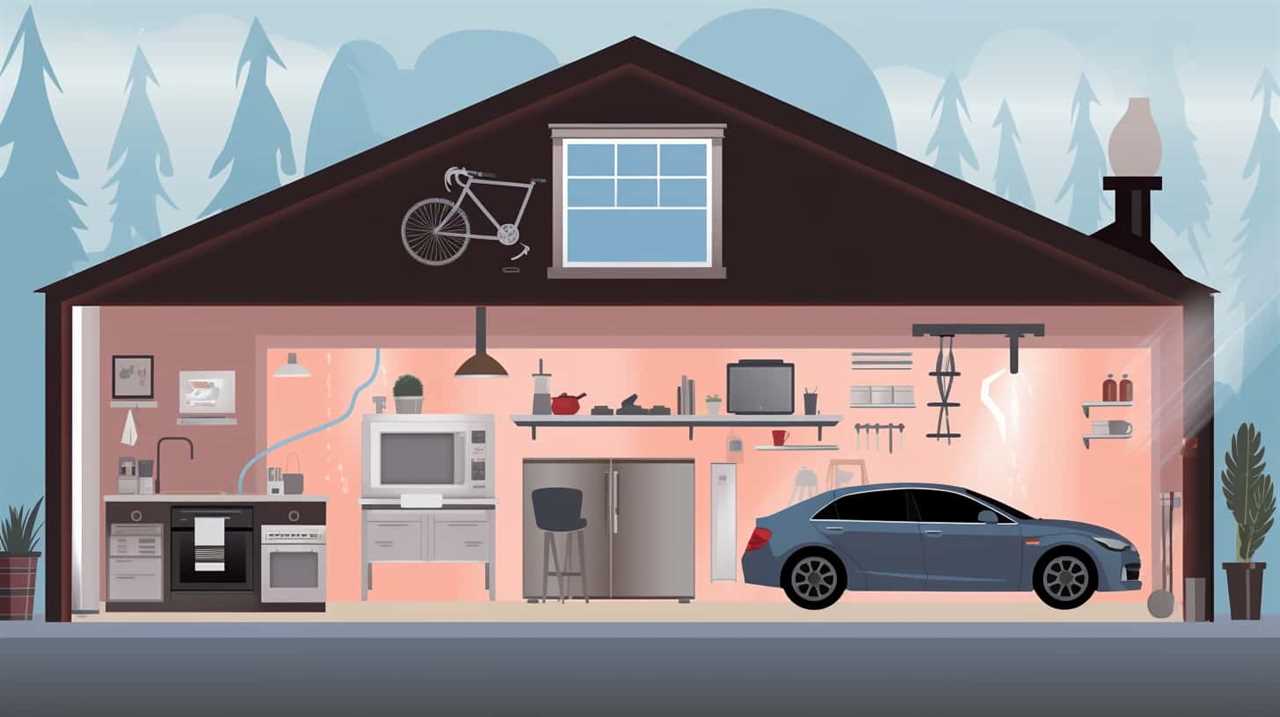
| Safety Measures | Description | Importance |
|---|---|---|
| Install Childproof Locks | Securely lock the dishwasher and washing machine doors to prevent accidental access. | High |
| Teach Water Safety | Educate children about the dangers of playing with water near these appliances. | High |
| Supervise Bath Time | Always supervise children during bath time to prevent accidents. | High |
Tips for Securing Small Appliances
To secure small appliances, start by placing them out of reach and using safety locks. This will help prevent accidents and keep your little ones safe.
Here are some tips to help you secure your small appliances effectively:
- Securing Coffee Machines:
- Keep coffee machines on high countertops or shelves that are out of reach of children.
- Use safety locks or latches on cabinets where you store your coffee machine to prevent curious hands from accessing it.
- Preventing Accidents with Slow Cookers:
- Always place slow cookers on a stable surface, away from the edge of countertops or tables.
- Use the cooker’s locking lid feature to prevent accidental spills or burns.
- Keep the power cord out of reach by using cord organizers or taping it down securely.
Childproofing Electrical Outlets and Cords
Childproofing our home includes taking essential measures to ensure the safety of electrical outlets and cords.
One of the first steps we can take is to install electrical outlet covers. These covers are designed to fit securely over the outlets, preventing children from inserting their fingers or other objects into them. It’s important to choose covers that are sturdy and tamper-proof, as some children may try to remove them.

Additionally, cord management is crucial in preventing accidents. Excess cords can be a tripping hazard, so it’s important to keep them out of reach or securely tucked away. Using cord clips or sleeves can help keep cords organized and out of sight. It’s also a good idea to use cord shorteners or wraps to prevent children from pulling on cords and potentially causing appliances to fall.
Ensuring Safety With Microwave Ovens
When it comes to childproofing microwave ovens, there are a few key points to keep in mind.
Firstly, ensuring that the microwave door latches securely is crucial to prevent accidental opening.
Secondly, consider the placement of the microwave to make it less accessible to young children.

Lastly, it’s important to educate your children about the potential hazards of the microwave and enforce rules about its usage.
Microwave Door Latches
We always make sure to check the condition of the microwave door latches as they’re an essential safety feature. Maintaining the door latches is crucial to prevent children from accidentally opening the microwave and potentially harming themselves.
Here are some important points to consider regarding microwave door latches:
- Regular maintenance: Regularly inspect the latches for any signs of wear and tear. If you notice any issues, such as a loose latch or difficulty in closing the door properly, address them immediately to ensure optimal safety.
- Childproofing alternatives: If your microwave doesn’t have a secure latch or if you want an extra layer of protection, consider using childproofing alternatives such as a microwave lock or adhesive straps. These can provide added security and prevent children from accessing the microwave without supervision.
By paying attention to microwave door maintenance and considering childproofing alternatives, you can ensure the safety of your children while using this household appliance.

Now, let’s move on to discuss the importance of proper placement and accessibility.
Placement and Accessibility
To ensure optimal safety with microwave ovens, it’s important to carefully consider the placement and accessibility of the appliance in the household.
When it comes to childproofing, it’s crucial to keep the microwave out of the reach of children. One effective way to achieve this is by placing the microwave on a high countertop or installing it in an upper cabinet. This ensures that little hands can’t reach the appliance and prevents any accidents from occurring.
Additionally, it’s important to organize cleaning supplies in the bathroom to further enhance safety. Keep cleaning solutions and chemicals in a locked cabinet or on a high shelf, away from children’s reach.
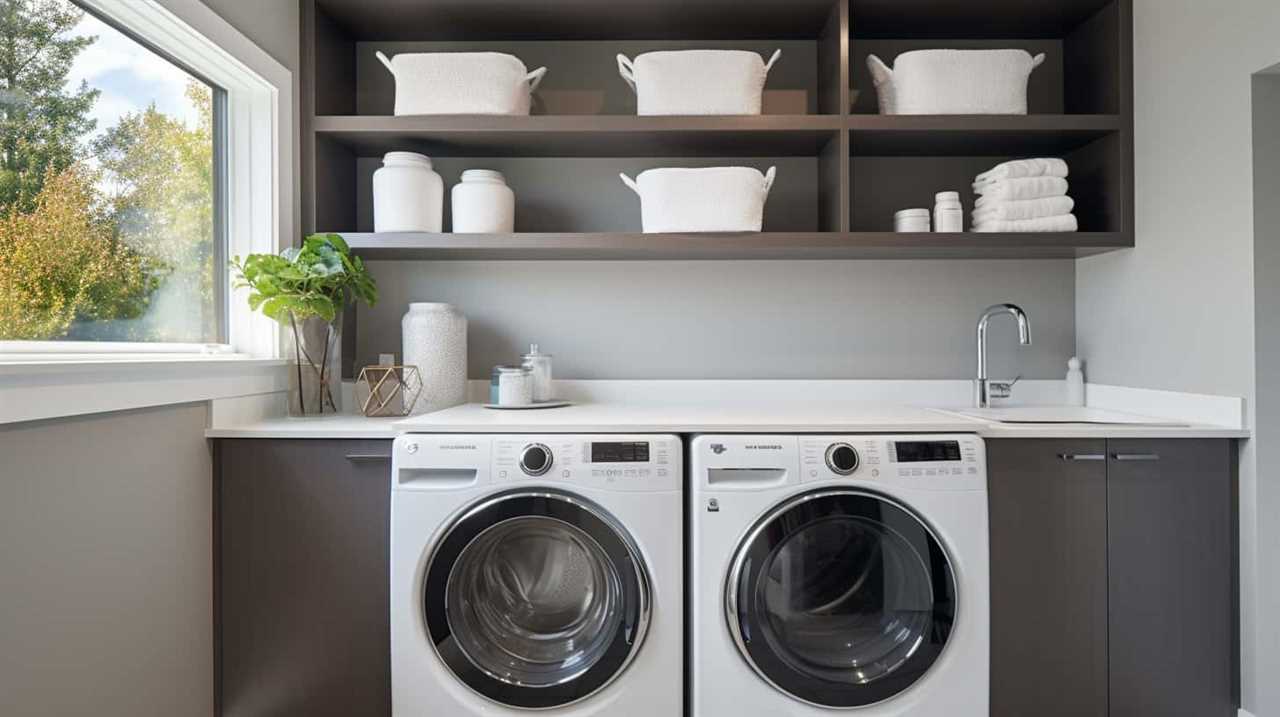
Educating About Potential Hazards
It is important to regularly educate ourselves and our loved ones about the potential hazards associated with microwave ovens. Microwaves are a common appliance found in many households, but they can pose risks if not used properly. To ensure safety, follow these guidelines:
- Keep metal objects and aluminum foil away from the microwave to prevent sparks and fires.
- Use microwave-safe containers and covers to avoid releasing harmful chemicals into your food.
- Avoid using plastic containers that aren’t labeled as microwave-safe, as they can melt or leach harmful substances into your food.
By being aware of these potential hazards and following safety regulations, we can reduce the risk of accidents and ensure the well-being of our loved ones.
Now, let’s move on to preventing accidents with toaster ovens and blenders.
Preventing Accidents With Toaster Ovens and Blenders
How can we ensure the safety of toaster ovens and blenders to prevent accidents?

Toaster ovens and blenders are common kitchen appliances that can pose certain risks if not used properly. Here are some essential safety measures to keep in mind when using these appliances.
First and foremost, always unplug the toaster oven or blender when not in use. This helps prevent any accidental activation or misuse by curious little hands. Additionally, make sure to place these appliances in a secure location, out of reach of children. This will minimize the chances of them getting burned or injured.
When using a toaster oven, be cautious of the hot surfaces and interior. Use oven mitts or heat-resistant gloves to handle any hot trays or racks. Allow the appliance to cool down completely before cleaning or storing it away.
Blenders, on the other hand, can be dangerous if not handled properly. Always ensure that the lid is securely in place before operating the blender. This prevents any potential spills or splatters that could result in burns or cuts. Never insert your hand or any utensils into the blender while it’s in operation.
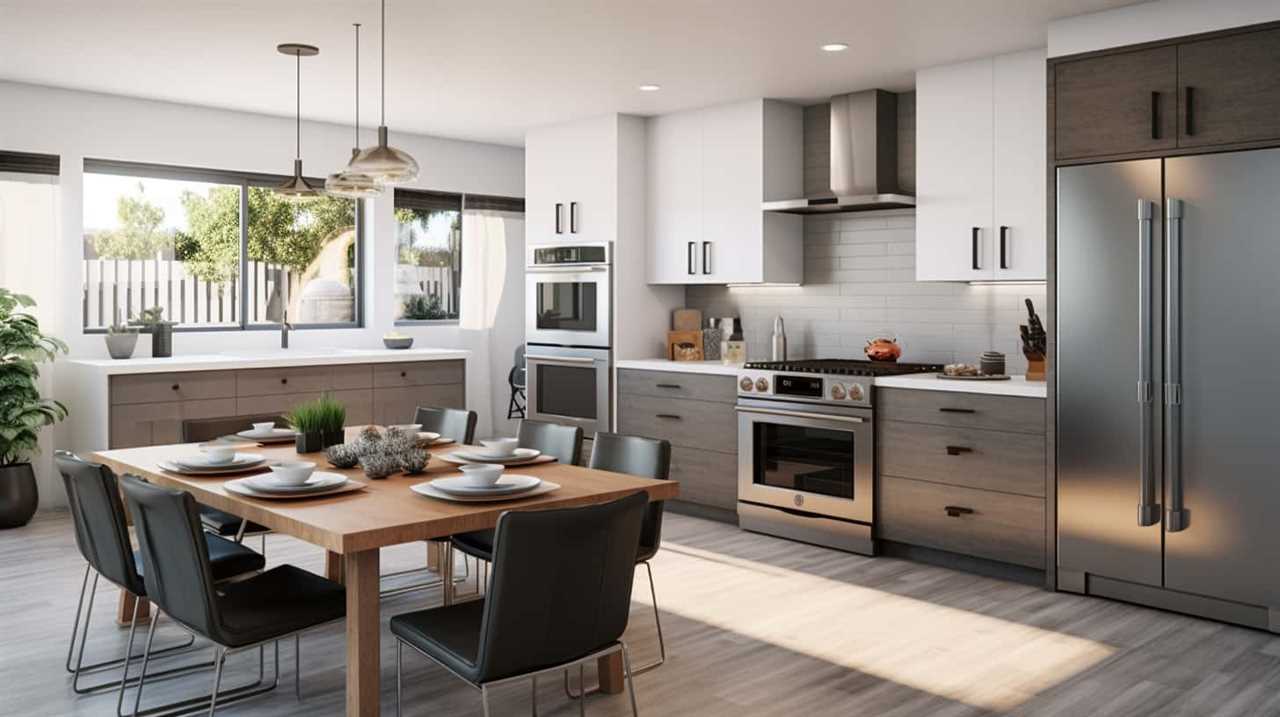
By following these simple safety measures, you can greatly reduce the risk of accidents with toaster ovens and blenders.
Now, let’s move on to the next section where we’ll discuss childproofing gas appliances and fireplaces.
Childproofing Gas Appliances and Fireplaces
Continuing from the previous subtopic, let’s discuss the importance of childproofing gas appliances and fireplaces to ensure the safety of our little ones.
When it comes to gas appliance safety, there are a few key measures that every parent should take:

- Install safety gates or barriers around gas appliances and fireplaces to prevent children from getting too close and potentially burning themselves.
- Keep all flammable materials, such as curtains or furniture, at a safe distance from gas appliances and fireplaces to reduce the risk of fire.
And when it comes to fireplace safety, there are a couple of additional precautions to keep in mind:
- Use a fireplace screen or gate to prevent children from touching the hot glass or getting too close to the flames.
- Never leave a fire unattended and make sure to extinguish it completely before leaving the room or going to bed.
Childproofing gas appliances and fireplaces is essential to protect our little ones from potential accidents and injuries. By implementing these safety measures, we can create a secure environment for our children to thrive.
Now, let’s move on to the next subtopic and discuss safety measures for water heaters and boilers.
Safety Measures for Water Heaters and Boilers
To ensure the safety of our children, we must take necessary precautions when it comes to water heaters and boilers.

Water heaters are a common household appliance that provide hot water for various purposes. It’s important to perform regular maintenance on these appliances to prevent any potential hazards. One of the first safety measures to consider is adjusting the temperature of the water heater to prevent scalding. Setting the temperature to a maximum of 120 degrees Fahrenheit can help reduce the risk of burns.
Additionally, it’s crucial to inspect the water heater periodically for any leaks or signs of damage. These can be indicators of potential problems that need immediate attention.
When it comes to boilers, there are several safety precautions to keep in mind. First and foremost, it’s essential to have a professional inspect and service the boiler annually. This will ensure that it’s functioning properly and not posing any risks.
It’s also important to have carbon monoxide detectors installed near the boiler and throughout the house. Carbon monoxide is a colorless and odorless gas that can be emitted by malfunctioning boilers, and it can be deadly if not detected.
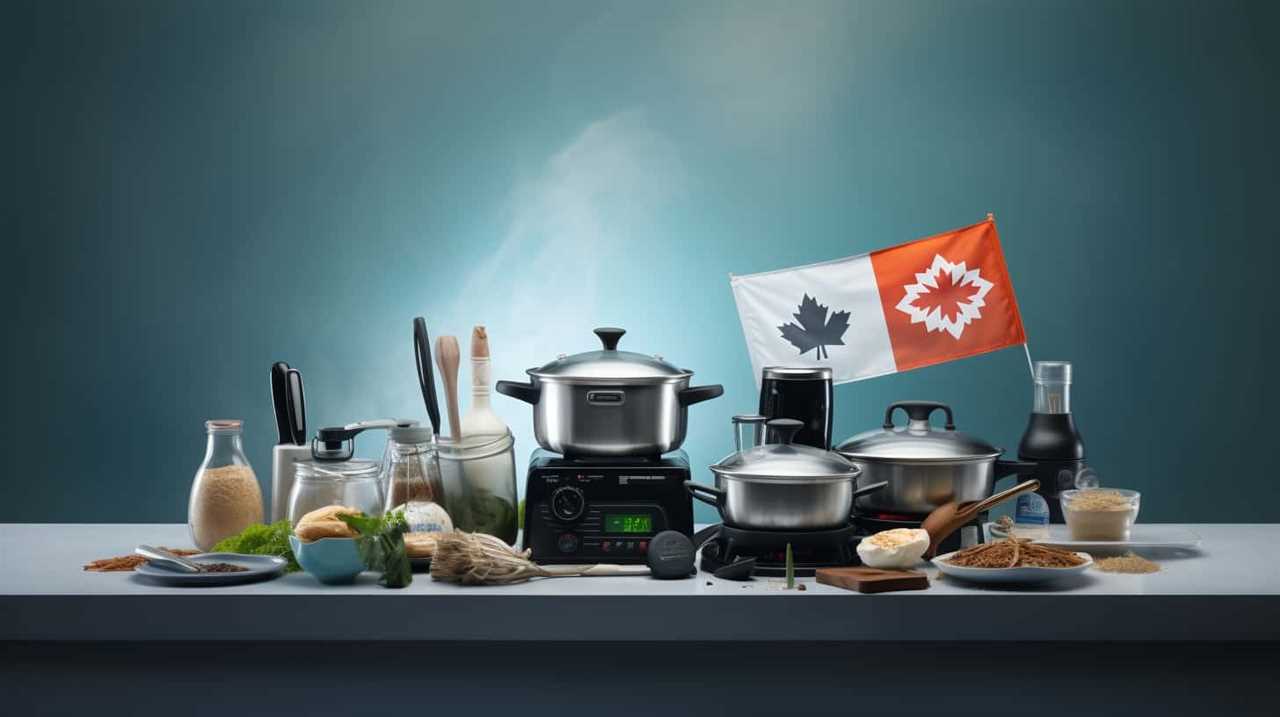
Regularly checking the pressure and temperature gauges on the boiler is another crucial step in maintaining its safety.
By following these water heater maintenance and boiler safety precautions, we can create a secure environment for our children.
Now, let’s move on to the next section, where we’ll discuss securing electronics and entertainment appliances.
Securing Electronics and Entertainment Appliances
For securing electronics and entertainment appliances, we need to take certain precautions. It’s important to childproof televisions and secure gaming consoles to ensure the safety of our little ones. Here are some essential measures to keep in mind:
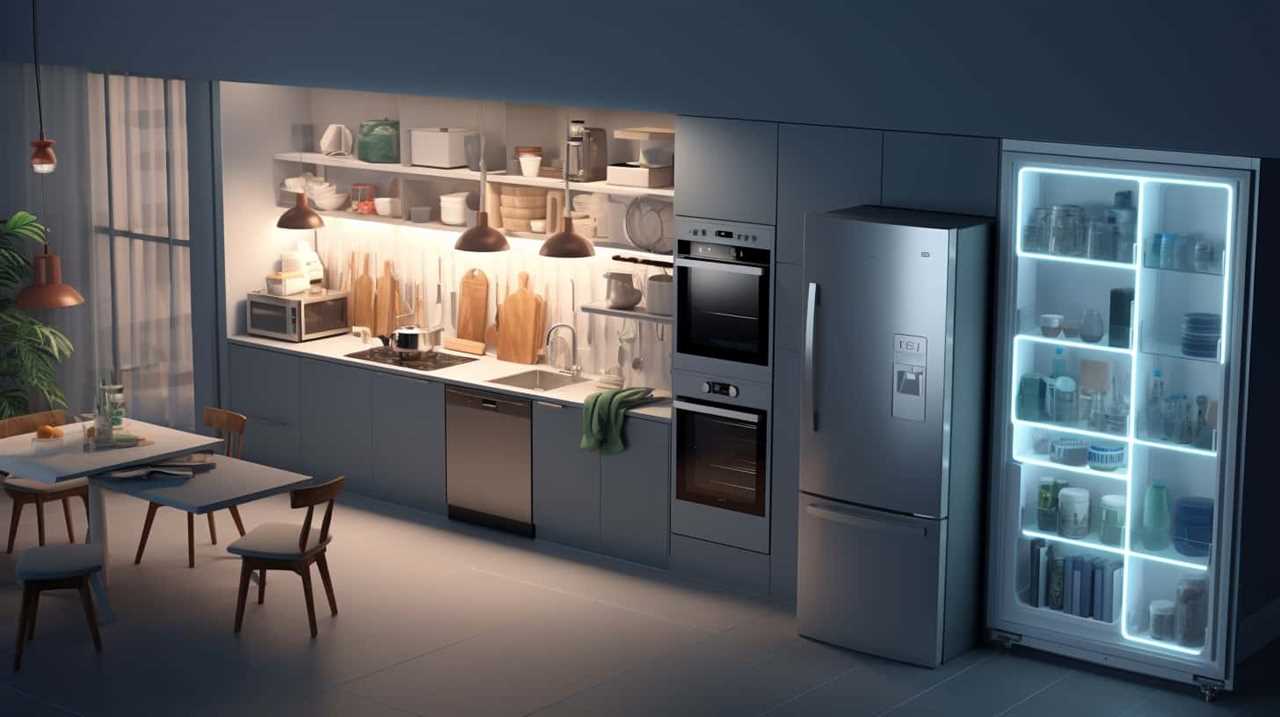
- Mount the television securely: Use wall mounts or sturdy TV stands to prevent the television from toppling over. Children can be curious and might accidentally pull on the TV, causing it to fall and potentially injure them.
- Secure gaming consoles: Gaming consoles are a popular source of entertainment for many households. To prevent them from falling and causing harm, make sure they’re securely fastened to the entertainment center or shelf. You can use straps or brackets specifically designed for this purpose.
- Hide cords and cables: Children are naturally drawn to cords and cables, posing a risk of tripping or pulling appliances down. Use cord organizers, cable covers, or wall-mounted cable concealers to keep them out of reach and minimize potential hazards.
- Use child locks and timers: If you want to limit your child’s screen time or prevent them from accessing certain features of the electronics, consider using child locks and timers. These can help you control and monitor their usage, ensuring a safe and balanced environment.
Frequently Asked Questions
Can Childproofing Appliances Completely Eliminate the Risk of Accidents?
Childproofing appliances can greatly reduce the risk of accidents. However, it’s important to understand that they can’t completely eliminate all potential dangers. These measures are effective in preventing many accidents, but there are limitations to consider. Children are curious and resourceful, and there’s always a chance they may find a way around the childproofing mechanisms.
Therefore, it’s crucial to combine childproofing with constant supervision and education to ensure the utmost safety for our little ones.
What Are Some Alternative Methods for Securing Small Appliances?
When it comes to securing small appliances, there are several alternative methods you can consider.
One option is using appliance locks or latches to prevent children from accessing them.

Another approach is to store small appliances in cabinets or high shelves that are out of reach.
Additionally, you can use cord shorteners or cord organizers to keep cords out of sight and prevent tripping hazards.
These alternative methods can help ensure the safety of children around small appliances.
Are There Any Specific Regulations Regarding Childproofing Gas Appliances?
There are specific regulations in place when it comes to childproofing gas appliances. It’s important to ensure that these appliances are securely locked and inaccessible to children.
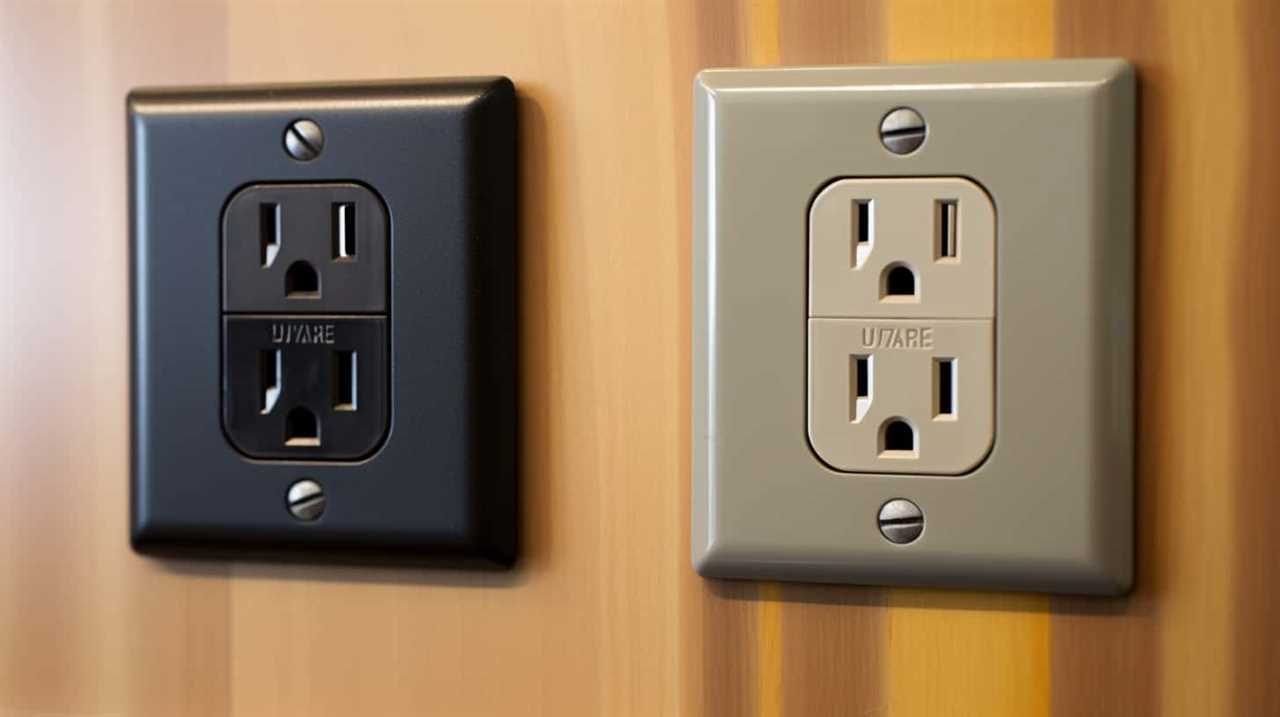
Gas appliances can be dangerous if not handled properly, so it’s crucial to follow the guidelines set by regulatory authorities.
How Often Should Childproofing Measures for Appliances Be Checked and Updated?
When it comes to childproofing measures for appliances, it’s important to regularly check and update them to ensure the safety of our little ones. We should make it a habit to inspect childproofing products frequently, looking for any signs of wear or damage.
Additionally, staying informed about common mistakes to avoid in childproofing appliances is crucial. By being proactive and taking these steps, we can create a safe environment for our children and prevent accidents from occurring.
Are There Any Special Safety Measures for Childproofing Water Heaters and Boilers?
When childproofing water heaters, it’s important to consider installation tips and potential hazards.

One key tip is to install a barrier around the water heater to prevent children from accessing it. This can be done using a childproof gate or a lockable cabinet.
Additionally, it’s crucial to set the water heater temperature to a safe level to avoid scalding accidents.
Regularly checking and updating these safety measures is essential to ensure the well-being of children in the home.
Conclusion
In conclusion, childproofing appliances is a crucial step in ensuring the safety of our little ones.
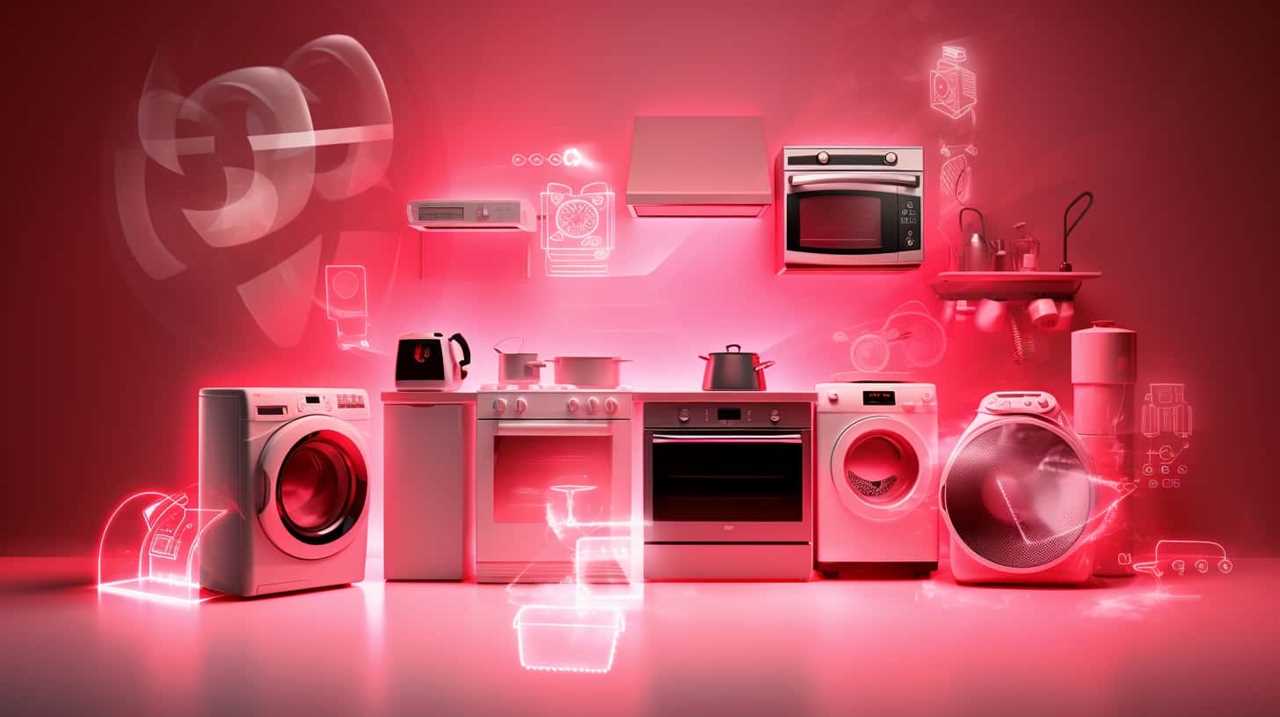
Did you know that every year, over 2,000 children are treated in emergency rooms due to accidents related to household appliances?
By following the safety measures outlined in this article, we can greatly reduce the risk of these accidents and create a safer environment for our children.
So let’s take action and childproof our appliances to protect our loved ones.






